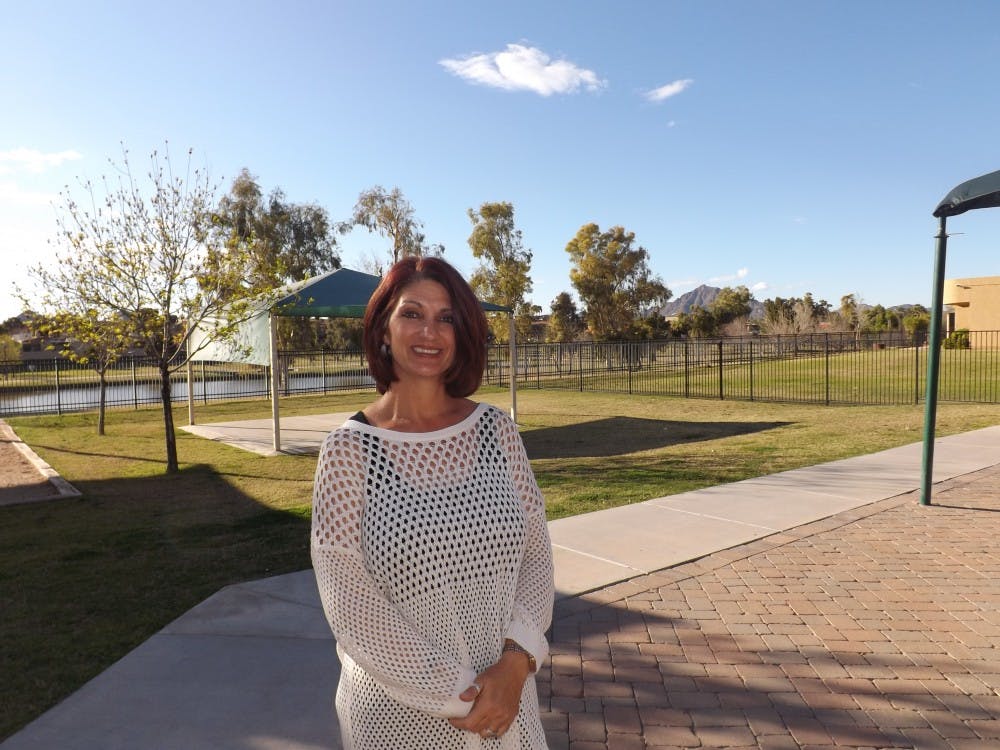A young girl runs out onto the soccer field with her teammates, excited and ready to play. The whistle blows and to her surprise the ball rests at her feet. She runs all the way down the field, shoots and scores her very first goal. Both teams cheer.
This little girl has cognitive disabilities and probably would not have been able to score if both teams hadn’t come together to contrive a plan that gave her that opportunity.
“I looked over and her dad, who is a single dad, was just crying. He said that was the best thing that he has ever seen happen to his daughter,” said Amy Papacek, then coach of the young girl’s soccer team. “To me, things like that solidify why I have a passion.”
Moments like this are frequent in Papacek’s life. She is the director of research and training at Chrysalis Academy, a private school for children on the autism spectrum, as well as a teacher in the middle school. Papacek is also an ASU professor who teaches undergraduate and graduate level special education instruction courses.
Papacek earned a master’s degree in education from ASU and holds a Ph.D. in curriculum and instruction of special education with an emphasis in autism.
Among her many titles, Papacek also calls herself “mom.” She has two daughters and two sons — the youngest of whom is on the autism spectrum with learning disabilities.
Having a son with autism may have had a small push toward focusing in the study of autism, but Papacek said she has always had an interest in special education.
“She engages students because she’s been there,” said Elizabeth Swadener, associate director of the School of Social Transformation and professor at ASU.
Swadener was also one of the members of Papacek’s doctoral committee and now works with Papacek at ASU. Swadener serves on the board of directors with her for the Jirani Project, a nonprofit organization that supports children in Kenya and is just one of the many service organizations to which Papacek belongs.
She’s not asking her students to do anything she hasn’t done; she has credibility from her work in the classroom and her research in the autism field, Swadener said.
Papacek has done a lot of research about the labels society places on people, including a study interviewing children that had siblings on the autism spectrum.
None of the children saw the diagnosis as part of their sibling. Papacek said she believes that if we could get away from labels as adults, we would have a better understanding and tolerance for other individuals.
“These kids are phenomenal,” Papacek said. “Your day can be the most physical, most heart-wrenching day ever and then you have a child that gives you one right answer after they’ve been struggling for a month and it makes it all worthwhile.”
While very much invested in it now, Papacek didn’t start her education wanting to be a teacher.
“I went into nursing and oncology because I had lost my first husband to cancer and I wanted to be there to help my patients,” she said. “I wanted to hold their hand, talk to them and talk to their families as their loved ones were going through treatment or passing away.”
She didn’t find that oncology nursing was exactly what she desired and pursued other interests.
After completing her bachelor’s in psychology at Ottawa University, she decided she needed a change of scenery.
“I picked Arizona, got in the car and drove here – almost literally,” she said.
In Arizona, Papacek had several jobs, including working as a flight attendant for America West Airlines and barely making their age requirement of 20 when she first applied. She worked as a flight attendant for eight years before having her first child.
Papacek wanted to go back to school and get her master’s in phycology but those around her knew that she was destined to teach.
“Everyone around me kept saying, ‘You know you’re a teacher. You’ve been a teacher your whole life. You teach ballet, you teach cheer, you teach soccer, you teach gymnastics. You’re a teacher,’” Papacek said.
David Hernandez-Saca, an ASU doctoral student of special education and one of Papacek’s colleagues, said he believes Papacek to be an amazing teacher, with an open mind and heart, which is very important in the field of special education.
“Amy is professional, provocative and has high expectations for her students," he said. "She is a dedicated service provider to children with autism in the Valley.”




